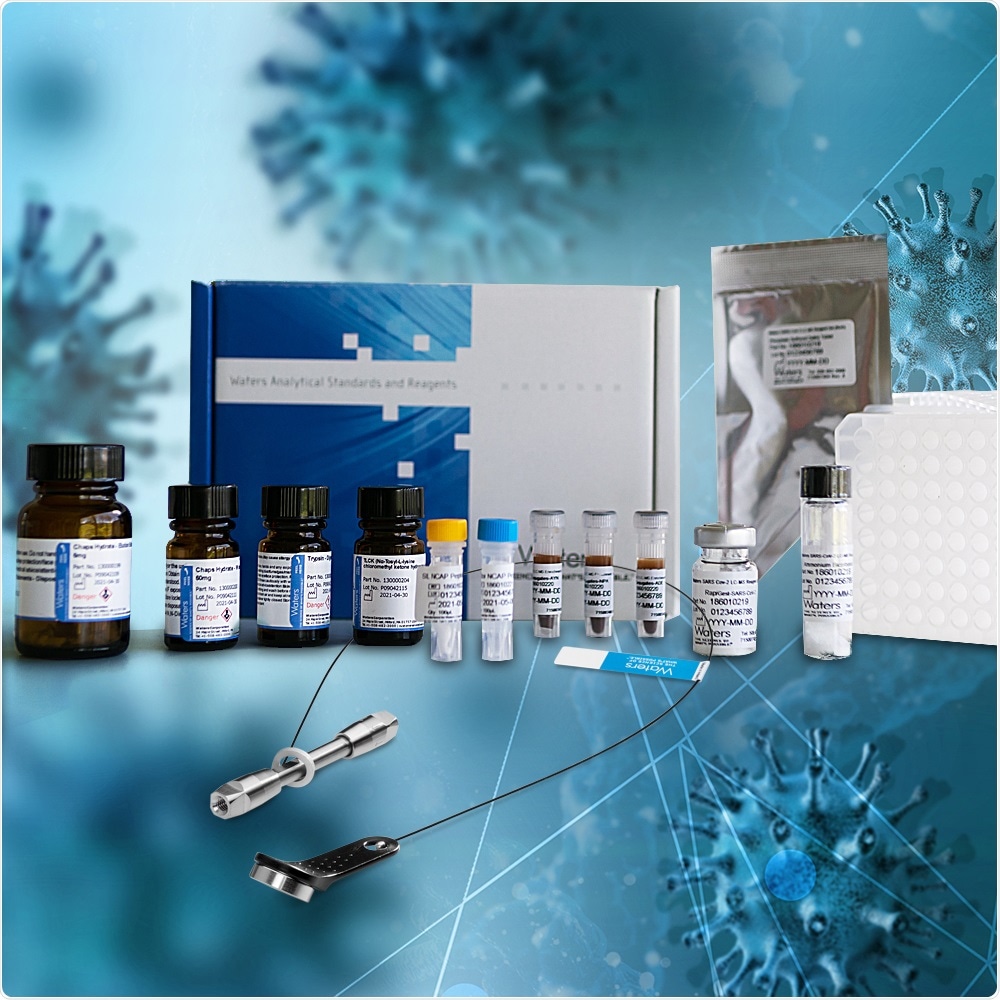Waters Corporation today introduced a new RUO LC-MS test method to advance critical infectious disease research. Waters™ SARS-CoV-2 LC-MS Kit (RUO) uses an orthogonal analytical method that directly detects and quantifies SARS-CoV-2 Nucleocapsid (NCAP) peptides that initial studies have shown to yield highly accurate, quantitative results.

Waters' SARS-CoV-2 LC-MS Kit (RUO). Image Credit Waters Corporation
“For biomedical and clinical research laboratories that are involved in fighting the pandemic, this kit offers a useful research tool for deeper study of the virus and the versatility to enable pioneering research of other infectious pathogens,” said Dr. Udit Batra, CEO and President, Waters Corporation.
The accelerated development of this method shows what’s possible through collaboration and represents an important step towards equipping scientists around the world with a highly versatile, reproducible, and quantitative platform capable of providing new insights into this and future pandemics.”
Dr. Udit Batra, CEO and President, Waters Corporation
Waters developed the SARS-CoV-2 LC-MS Kit (RUO) in support of a coalition of academic, commercial and government research scientists1. This coalition worked to develop an alternative test method on LC-MS platforms in support of the United Kingdom’s National Health Service (NHS) Test & Trace program. Their goal was to create a complementary, high-throughput screening method that would also use different reagents to help relieve strain on the PCR reagent supply chain. In just 16 weeks, the research coalition went from development of the method in university labs to a translated LC-MS workflow – upon which the SARS-CoV-2 LC-MS Kit (RUO) is based.
Analytical tests show that researchers can achieve the analytical sensitivity required to detect and quantify low levels of three unique peptides derived from the SARS-CoV-2 NCAP protein – data on the Xevo™ TQ-XS System shows a lower limit of quantitation of just 3 amol/µL. This is possible through the use of an innovative anti-peptide antibody enrichment sample preparation method and antibodies from SISCAPA® Assay Technologies that improves the performance of mass spectrometry for measurement of pre-selected protein targets. Results can be captured with clean, low-noise chromatograms in less than two minutes per sample.
While further investigation is needed to collect objective evidence in promising research applications, initial test results and the readily adaptable properties of the analytical test method indicate the RUO kit could be leveraged for the following research studies:
- Peptide concentration 2 – quantitate SARS-CoV-2 signature peptides at different stages of infection
- Research of infection and long-term effects through peptide quantitation
- Future pandemic preparedness studies and research of signature peptide-based biomarkers may enable future research of other infections
The Waters SARS-CoV-2 LC-MS Kit (RUO) has been optimized on the ACQUITY™ I-Class Plus System and the Xevo TQ-XS System. It comes in an adaptable automation-friendly format with liquid handling protocols for the Andrew+ Pipetting Robot on OneLab™ Software.
This kit is for research use only and has not been approved for use in clinical diagnostic procedures. This RUO kit has not been tested with clinical samples.